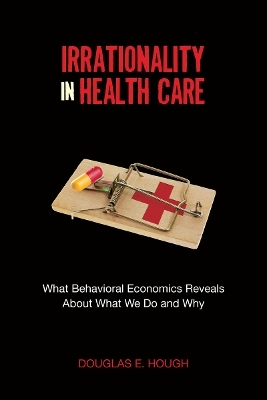
Irrationality in Health Care
What Behavioral Economics Reveals About What We Do and Why
Seiten
2014
Stanford University Press (Verlag)
978-0-8047-9340-7 (ISBN)
Stanford University Press (Verlag)
978-0-8047-9340-7 (ISBN)
This book draws on behavioral economics to explain anomalies that are intrinsic in the U.S. health care system. Rather than focusing on promoting or analyzing policy, author Douglas E. Hough hones in on our sometimes irrational actions, their roots, and what we can do to influence our behavior, nudging the health care system towards better practices.
The health care industry in the U.S. is peculiar. We spend close to 18% of our GDP on health care, yet other countries get better results—and we don't know why. To date, we still lack widely accepted answers to simple questions, such as "Would requiring everyone to buy health insurance make us better off?" Drawing on behavioral economics as an alternative to the standard tools of health economics, author Douglas E. Hough seeks to more clearly diagnose the ills of health care today.
A behavioral perspective makes sense of key contradictions—from the seemingly irrational choices that we sometimes make as patients, to the incongruous behavior of physicians, to the morass of the long-lived debate surrounding reform. With the new health care law in effect, it is more important than ever that consumers, health care industry leaders, and the policymakers who are governing change reckon with the power and sources of our behavior when it comes to health.
The health care industry in the U.S. is peculiar. We spend close to 18% of our GDP on health care, yet other countries get better results—and we don't know why. To date, we still lack widely accepted answers to simple questions, such as "Would requiring everyone to buy health insurance make us better off?" Drawing on behavioral economics as an alternative to the standard tools of health economics, author Douglas E. Hough seeks to more clearly diagnose the ills of health care today.
A behavioral perspective makes sense of key contradictions—from the seemingly irrational choices that we sometimes make as patients, to the incongruous behavior of physicians, to the morass of the long-lived debate surrounding reform. With the new health care law in effect, it is more important than ever that consumers, health care industry leaders, and the policymakers who are governing change reckon with the power and sources of our behavior when it comes to health.
Douglas E. Hough is Associate Professor at Johns Hopkins University, where he teaches health economics, behavioral economics, and strategy at the Carey Business School and the Bloomberg School of Public Health. Hough has served as a research economist at the American Medical Association and as a consultant in three health care strategy firms.
| Zusatzinfo | 7 tables, 7 figures |
|---|---|
| Verlagsort | Palo Alto |
| Sprache | englisch |
| Maße | 152 x 229 mm |
| Gewicht | 431 g |
| Themenwelt | Sachbuch/Ratgeber ► Gesundheit / Leben / Psychologie |
| Medizin / Pharmazie ► Gesundheitswesen | |
| Sozialwissenschaften ► Politik / Verwaltung ► Staat / Verwaltung | |
| Sozialwissenschaften ► Soziologie | |
| Technik | |
| Wirtschaft ► Betriebswirtschaft / Management ► Marketing / Vertrieb | |
| Wirtschaft ► Betriebswirtschaft / Management ► Unternehmensführung / Management | |
| Wirtschaft ► Volkswirtschaftslehre ► Mikroökonomie | |
| ISBN-10 | 0-8047-9340-9 / 0804793409 |
| ISBN-13 | 978-0-8047-9340-7 / 9780804793407 |
| Zustand | Neuware |
| Haben Sie eine Frage zum Produkt? |
Mehr entdecken
aus dem Bereich
aus dem Bereich
Organisationen steuern, Strukturen schaffen, Prozesse gestalten
Buch | Softcover (2024)
Rehm Verlag
38,00 €


